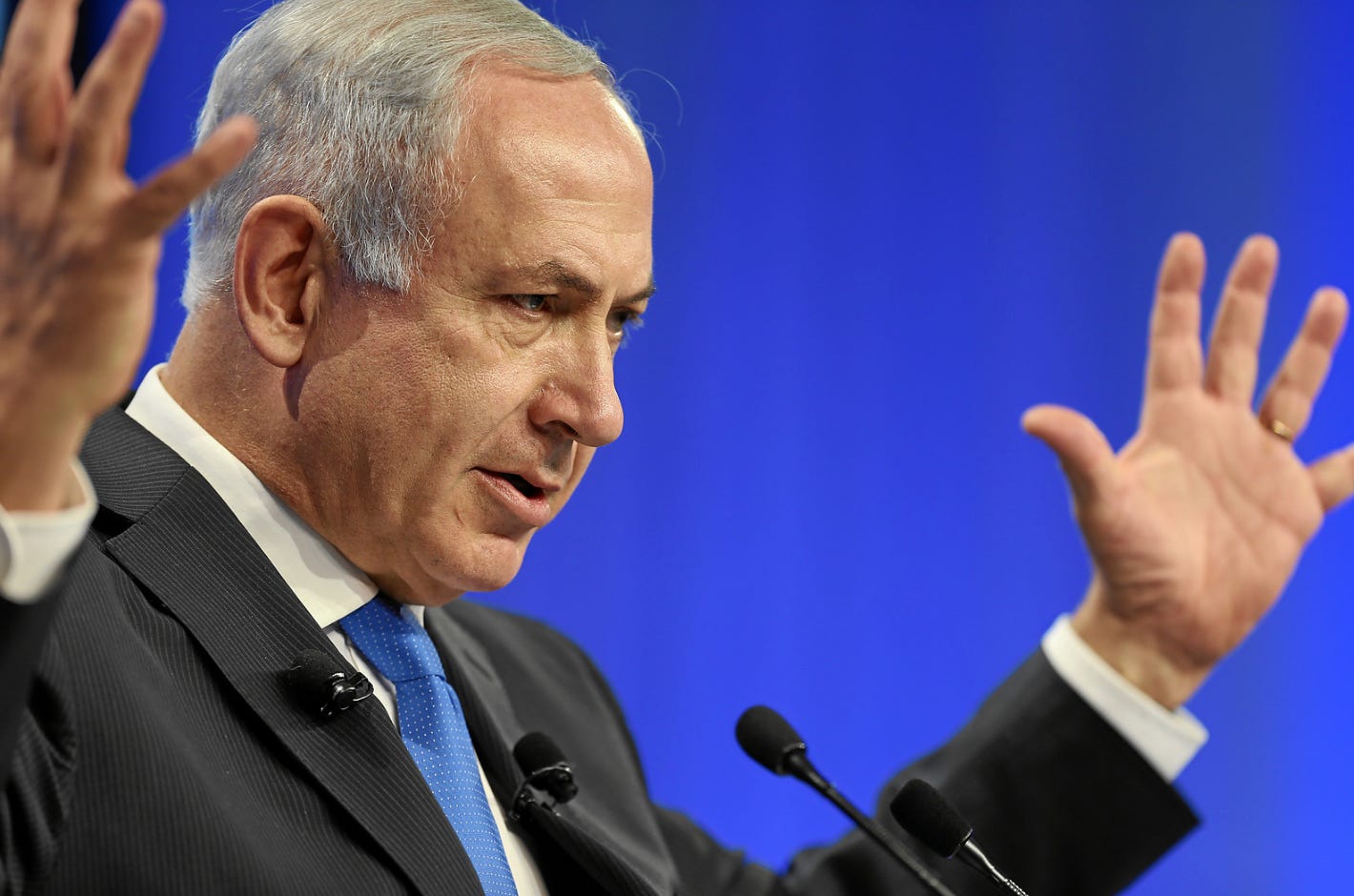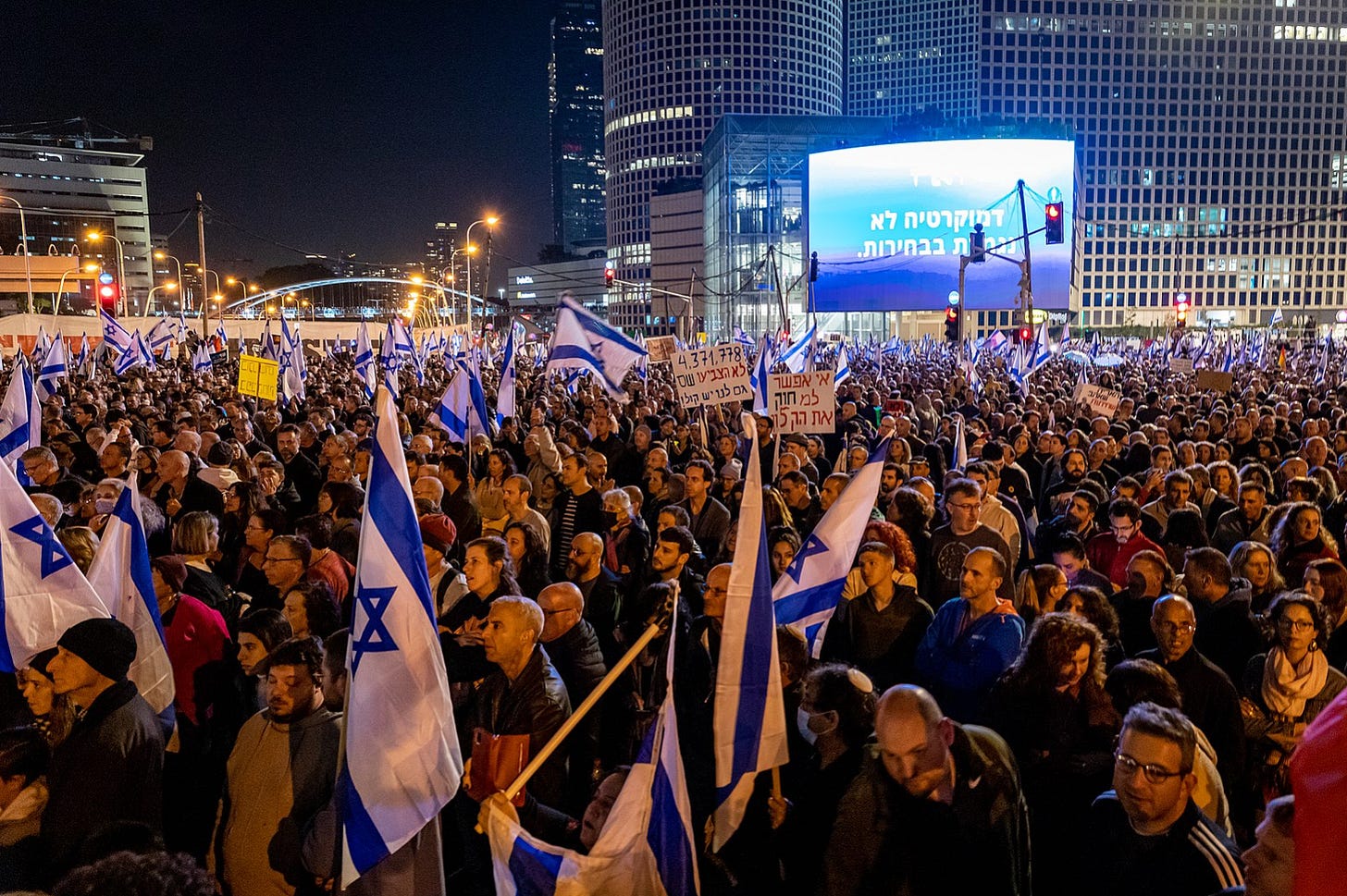NYT writes: "How Netanyahu Prolonged the War in Gaza to Stay in Power" - but is it true?
The article reads like a critique of Netanyahu, but is in reality a furious objection to Israel, and policies that are supported by most Israelis.
The New York Times published an article by Patrick Kingsley, Ronen Bergman and Natan Odenheimer last week entitled, “How Netanyahu Prolonged the War in Gaza to Stay in Power” sparking a public debate between the publication and the Israeli Prime Minister. Though the article reads like a critique of Israeli Prime Minister Benjamin Netanyahu, it is in reality a furious objection to certain Israeli policies that are not only vital to Israel’s safety, but are also supported by the broad consensus of Israeli society. Kingsley, Bergman and Odenheimer accomplish their article’s dubious agenda by taking a few kernels of truth, lifting them out of context, distorting them beyond all recognition, and finally, by adding a healthy smattering of outright factual errors.
Photo: Benjamin Netanyahu, pictured in “Israel's Economic and Political Outlook: Benjamin Netanyahu” by World Economic Forum, CC BY-NC-SA 2.0 via Flickr.
We must start with a certain piece of context - perhaps the only fact that truly matters in a democracy: Netanyahu’s Likud party currently leads in Israeli polls. Moreover, Likud has led in Israeli polls for most of the past 20 months (during Israel’s war against the Hamas terror organization, Iran and its various other proxies).
At times, some polls have put Likud slightly behind a theoretical party that might be formed by former Prime Minister Naftali Bennet, yet this is not a realistic comparison: the “Bennet party” does not yet exist, and due to the candidate’s health problems, it may never exist. Furthermore, theoretical parties typically have elevated polling numbers because they have not yet adopted real positions on real issues. The most popular party after Likud that actually exists in the real world (Yair Lapid’s “Yesh Atid” party) has roughly half the support that Likud does.
In short, it is unrealistic to claim that Netanyahu’s Prime Ministership is in some way illegitimate, at least by the standards of a modern democracy.
The following are some of the specific assertions from the article that require proper context:
“Netanyahu’s approach to Hamas helped to strengthen the group…”
Yes, arguably Netanyahu’s approach, which included significant aid to Gaza over the years, did help to strengthen Hamas. The same is true of Ariel Sharon, Ehud Olmert, Ehud Barak, Naftali Bennet and Yair Lapid: in other words, every Israeli leader for the last 25 years: from the left, right and center.
Why?
Because Hamas controls Gaza, and there is no practical way to provide aid and stability to Gaza without Hamas controlling that aid.
So why provide aid at all?
Photo: The Hamas terror organization. Credit: IDF.
Both internationally, and on the Israeli left, aid to Gaza (even when it comes under Hamas control) is framed as a moral issue due to the impact on civilians. Yet even Israel’s center and right, widely believed that increased aid was linked to a reduction in terrorism (as per private conversations I’ve had with experts from Israel’s COGAT and other departments). Only now, in retrospect has it become clear that Hamas apparently cultivated this image on purpose, in order to stockpile aid in preparation for the October 7, 2023 massacre. Naftali Bennet was one of the few Israeli leaders to speak out against supporting Hamas (most notably during his 2021 political campaign), but after becoming Prime Minister, he provided essentially the same support to Hamas as his predecessors, including Netanyahu.
Why did so many Israeli leaders, from all political stripes, continue to support Hamas?
In retrospect, the reason is clear: it is extremely difficult to cultivate an alternative. Israel began the process of bypassing Hamas last March by cutting off aid entirely, and later helping to form the aid distribution alternative, GHF (Gaza Humanitarian Foundation). Both projects triggered massive international condemnation and significant dangers on-the-ground: including Hamas attacks on civilians and aid workers. As challenging as bypassing Hamas is today, it was effectively impossible in prior years for three reasons: 1. before October 7, 2023 the need was not seen as sufficiently urgent (even in Israeli society), 2. the IDF had not yet succeeded in massively degrading Hamas, and 3. prior U.S. administrations were not adequately supportive of such a dramatic initiative.
So was Netanyahu’s approach wrong? Perhaps. Was there any viable alternative? No. Did any other Israeli leader perform differently? Definitely no.
“Netanyahu’s push to undermine Israel’s judiciary widened already-deep rifts within Israeli society and weakened its military, making Israel appear vulnerable and encouraging Hamas to ready its attack.”
Some analysts believe that Hamas looked at Israel’s protests over judicial reform in 2023 and saw division, weakness - and opportunity. (Hamas later discovered just how wrong that conclusion really was.) Yet even the NYT article implicitly admits that it was the protests which triggered Hamas’s opportunistic reaction, and not the judicial reforms alone. This does not mean the reforms were right, nor that the protests were wrong, merely that “it takes two to tango” or in this case: it takes two to demonstrate disunity. We have written much about judicial reform, but in brief, our view is that: 1. Israel’s judiciary does need reform, 2. the specific reforms Netanyahu was pushing were, in some respects, not right for Israel, but the status quo wasn’t a viable option either, and 3. the Israeli left was actually the first group to turn Israel’s court system into a “political football,” by trying to defeat Netanyahu in court after they couldn’t defeat him in several elections.
Photo The 2023 Judicial reform protests in Israel. Photo by Oren Rozen via Wikimedia Commons.
In short, there’s plenty of blame to go around regarding the side effects of judicial reform efforts and the ensuing protests, yet both are examples of Israel’s democracy. The fact that Hamas misinterpreted this as an opportunity for bloodshed doesn’t mean Israelis shouldn’t engage in democracy.
“Netanyahu’s decisions extended the fighting in Gaza longer than even Israel’s senior military leadership deemed necessary.”
and
“Netanyahu slowed down cease-fire negotiations at crucial moments, missing windows in which Hamas was less opposed to a deal.”
At no time has the IDF or “Israel’s senior military leadership” taken an official position against continuing the war in Gaza. The nearest thing to public support for this claim is a July, 2024 NYT article which was based entirely on anonymous sources, and which the IDF officially refuted.
That said, some in Israeli society (incorrectly) believe that Hamas has put some kind of deal “on the table” that would release all Israeli hostages in exchange for a total end to the war. This statement is simply, factually, untrue: Hamas has not offered such a deal. At various times Qatar and Egypt suggested frameworks that would involve ending the war and releasing all the hostages, however at no time did Hamas propose, or agree to, any such framework - the claim is nothing short of fiction. Accordingly, recent polls which show that 74% of Israelis support ending the war in Gaza in exchange for a return of all the hostages, refer to an imaginary deal that is not actually “on the table” in the real world.
Photo: IDF soldiers in combat, by IDF.
Even if Hamas had agreed to such a framework, the Prime Minister of Israel is obligated to balance the need to bring home Israeli hostages against the need to make sure this sort of massacre never happens again: which would result in even more deaths, rapes, torture and of course, more hostages. Israel’s official, legal war goals, as agreed to by the multi-party War Cabinet on October 11, 2023 are to: 1. bring home the hostages, and 2. end Hamas’s military and civil control in Gaza. Israel has been working toward balancing and accomplishing both of those goals since that time.
“This was partly a result of Netanyahu’s refusal — years before Oct. 7 — to resign when charged with corruption, a decision that lost him the support of Israel’s moderates and even parts of the Israeli right”
Netanyahu was charged with corruption and other similar offenses - not convicted. A “charge” or an “indictment” is basically a legal word for a specific kind of accusation. The NYT thus implies that a mere accusation by Netanyahu’s political opponents should have the power to overturn the results of an Israeli election. Not only does such an assertion make no logical sense, but it flies in the face of Israeli law: which does not require a PM to step down on the basis of an accusation or indictment (Article 18 of Israel’s Basic Law on Government, 2001).
“...he instead built a fragile majority in Israel’s Parliament by forging alliances with far-right parties. It kept him in power, but it tied his fate to their extremist positions, both before the war and after it began.”
Israel’s current governing coalition represents a slim majority that includes fringe political parties, and in some cases Netanyahu has had to bend to those parties’ agendas. However, the main target of this article’s criticism, which is Israel’s conduct of a seven front war over the past two years, is actually supported by the Israeli mainstream.
Had Israel’s center and center-left been more interested in governing than in ousting Netanyahu, they might have formed a broad, centrist coalition with Likud, thus excluding the fringe parties entirely. This is another one of those situations where there’s plenty of blame to go around. Yet in essence, the NYT’s main criticism of Netanhayu is that he 1. won an election and 2. formed a coalition with other parties that legitimately won Knesset seats, and were willing to join him. That’s democracy.
Photo: Yair Lapid, head of Israel’s major opposition party: Yesh Atid. By Sapir College via Wikimedia Commons.
“...he [Netanyahu] avoided planning for a postwar power transition, making it harder to direct the war toward an endgame.”
There is widespread misinformation on this topic, including a measure of historical ignorance. Similar to most reconstruction efforts in history, it is not possible to plan for a post-Hamas Gaza until after Hamas is defeated, because (understandably) local groups in Gaza will not take part in the planning until they feel safe.
This phenomenon was also true of the Marshall Plan that built post-war Germany, as well as the post-war plans for Korea, Japan and Kosovo and numerous other examples: in which reconstruction planning was properly begun only after the hostile powers were fully defeated or permanently removed from the relevant territory. For more depth on this, see my article in former Ambassador Michael Oren’s publication, “Clarity.”
“When momentum toward a cease-fire seemed to grow, Netanyahu ascribed sudden significance to military objectives that he previously seemed less interested in pursuing, such as the capture of the southern city Rafah.”
This is highly misleading and actually offensive. Due to limited Israeli troop strength, and also due to concern over Gaza’s civilians, Israel began its military campaign in northern Gaza and moved by stages to the south (where Rafah is) while conducting civilian evacuations along the way. By the time the IDF reached southern Gaza, Hamas was mostly concentrated in Rafah, as were the Israeli hostages. In short, every part of Gaza was always strategically important, but the IDF is simply not equipped to do everything simultaneously. Moreover, many Israelis would (understandably) find it both offensive and immoral to object to the IDF entering a location that contains Israeli hostages in Hamas captivity.
“He has successfully prevented a state inquiry that would investigate his own culpability, saying that the fallout must wait until the Gaza war ends”
Netanyahu has not “prevented” an inquiry - he has delayed an inquiry over an ongoing war until after the war is complete. One can certainly argue about whether it is appropriate to complete a post-war report while the war is ongoing: for example, the report of America’s 9/11 Commission covering the attacks of September 11, 2001 was completed about a year later, while the U.S. was still fighting Al Qaeda. However, the Iraq Study Group report, covering the 2003 Iraq war, was completed in 2006, which was three years after hostilities, and Congress’s “Investigation of the Pearl Harbor Attack” was completed in 1946: after World War II had ended and five years after the event itself had taken place.
“...his government is now moving to fire the attorney general who oversees that prosecution.”
As Israel does not have a constitution, it is not always clear who may fire various political appointees. The attorney general has a semi-independent status, and any “semi” status is a recipe for chaos.
The attorney general works for the government and therefore ought to be fire-able by the government. Yet the attorney general investigates government officials over corruption, etc, so perhaps she should not be fire-able by those same officials. On the other hand, a person who wields political power but is not elected and cannot be fired at all is essentially a dictator, so there’s no good answer here.
In this case, the attorney general, Gali Baharav-Miara, has taken active part in opposing numerous government decisions and policies in court, essentially granting herself a legislative role, which critics say is not appropriate. This is a complex situation without a clear “right” answer.
Photo: Attorney General Gali Baharav-Miara by Tomer Jacobson via Wikimedia Commons.
There are plenty of areas where Israelis disagree on Netanyahu and on policy, yet the specific points in this NYT article are not only out of context and twisted, but they relate to issues where there is typically broad consensus within Israeli society. The NYT isn’t really critiquing Netanyahu: it is critiquing Israel, and Israel’s war of self defense. Critiquing Israel, when done fairly, honestly and according to the same standards applied to other nations, can be legitimate - but this particular article is none of those things. Add the fact that Netanyahu remains popular in the polls, it’s hard to see how the NYT is saying anything other than their journalists know what’s best for Israel better than Israelis do.








I stopped reading the NYT about a year after the 10/7 attacks. I am neither Jewish nor Israeli—I can’t imagine reading it as a Jew or an Israeli and not losing one’s ever loving mind. You are doing a great job and this article was quite informative. Send it to the NYT as a letter to editor.
And what is the deal with Bergman?
Too many critics of Israel have made the rookie mistake of conflating Netanyahu’s personal agenda with the conduct of this very just war.
Thanks for setting the record straight.